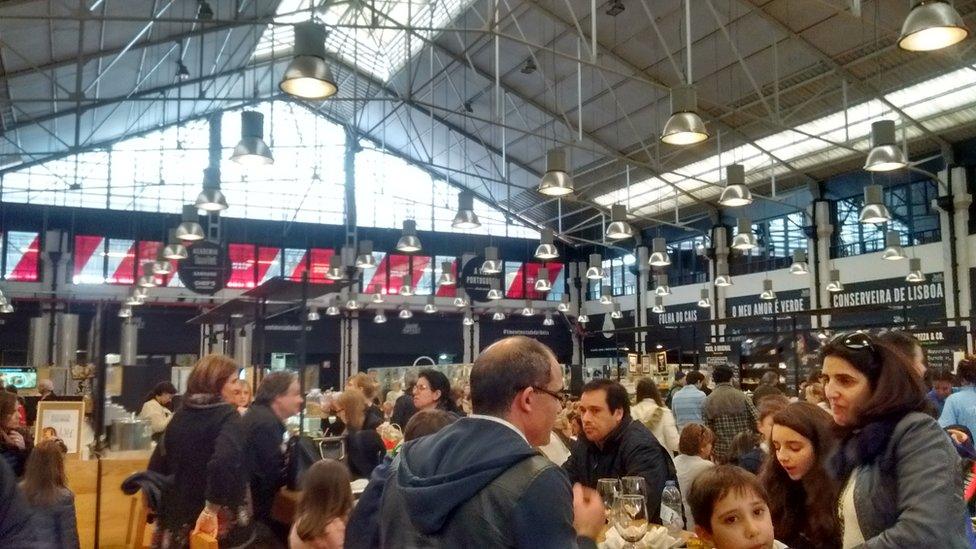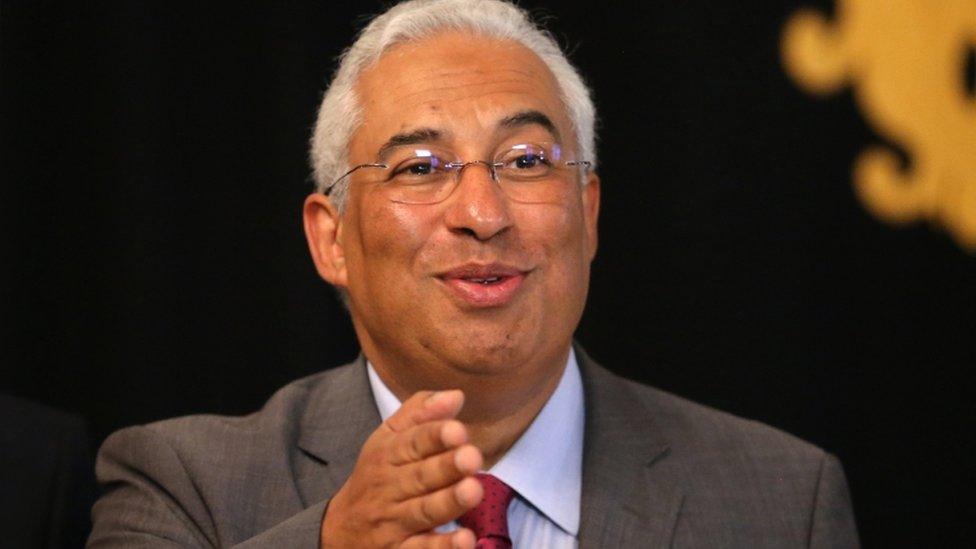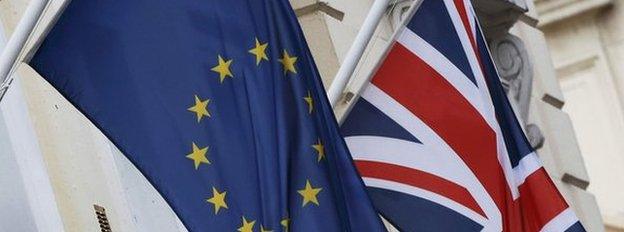Portugal wrinkles its nose at UK's EU deal
- Published
- comments

Mark found the UK renegotiation wasn't a big talking point in Lisbon
Joanna Pedro twists her hair in her hands, visibly upset at the idea that the British Prime Minister wants to cut benefits, external to people from her country who work in Britain.
She is a Portuguese nurse and worked in the UK for four years. She left home because her husband got a job in Britain.
She says neither of them made any welfare claims in the UK. She did get child benefit when she had a baby - and although that wouldn't be cut she thinks the principle of cutting benefits is unfair.
"I think it is wrong - if you are there you are contributing with your work and your taxes."
Would it stop her coming? Perhaps.
"How can you go to a country, paying your taxes, and you're getting nothing back?"
That of course is what the Prime Minister wants - to put people off.
The head of Portugal's nurses organisation tells me she would like her government to stop the plan - and the NHS will suffer if it goes ahead.
I came to Lisbon with a couple of questions in my mind:
Would Mr Cameron's much debated "emergency brake" on in-work benefits actually discourage people from coming to Britain?
If people feel as strongly as Joanna, do they expect their government to block Mr Cameron's plans at the summit in less than two weeks' time?
No-one I speak to says that welfare payments are a reason to go to the UK.
Portugal's economy has been dire since the economic crisis, with unemployment around 11 %, and many people have gone abroad to find work: around two million, external, which equates to 20% of the population.
I get the feeling that this has become not an act of desperation, but one of adventure and growth, almost a rite of passage. Perhaps it is the legacy of a nation that was the first to cross the seemingly limitless Atlantic in quest of brave new worlds.

The new government dominates the political agenda in Lisbon
I talk to a group of students, friends who all would like to go to Britain.
Rodrigo de Olivera has applied for jobs in London and Scotland. He says it is about going to new places, meeting new people. So ask him why not seek that in, say, Lithuania or Italy?
"Most of all because it is where you can use your English, your main language - I mean I don't speak Lithuanian."
But what about benefits?
"I think that is an attraction - but the job market in Britain is much better, the standard of living higher."
His girlfriend has a different perspective - in Portugal everyone wants to interfere in your life, in London you can be more anonymous. She likes the fact that no-one talks to each other on the Tube.
So from their point of view the solution to the problem Mr Cameron sees are obvious - crash the economy, stop speaking English, and perhaps start chatting animatedly on public transport.
A film crew from Portugal's main news channel films my interview with nurses, external, but it would be wrong to suggest that Mr Cameron's plans are big news.
In fact the night I meet the students it's a football match that seems to grab everyone's attention.
Other people's problems
Portugal is a good example of one of the things that makes the European Union so complex - every country has a different crisis to cope with, different headlines in the newspapers - a huge crisis for one member is something that is only noticed by weirdoes and wonks in another.
A new left-wing government has just been elected in Portugal - the socialists are in power, supported in Parliament by the old Communists, and their priority is jettisoning years of austerity, whether Brussels and Berlin like it or not.
They have just about done a deal, external, but there is huge resentment that the EU is enforcing what they see as conservative orthodoxy at the expense of working people.
It is a salutary reminder that while annoyance at the EU is commonplace, the reasons for it are very different.

Antonio Costa became Prime Minister in November
We chased hard to get an interview with the government, but couldn't even squeeze a statement out of them, although they condemned Mr Cameron's plan, external before the EU offer.
Their voters might be cross and offended by Mr Cameron's demands but, for them, it is better to be scorned than find the UK's borders shut.
Portugal's new Prime Minister, external has a reputation as a canny operator.
My guess is that he will make a bargain, backing the deal on the table, in return for other concessions.
That may be a general pattern - all the Prime Ministers and Presidents realise that to send Mr Cameron home empty-handed would be a disaster for the "remain" campaign.
While we will have a vigorous debate about whether staying or going is best for our country, there is no real argument about what Brexit would mean for the EU itself.
After some horse-trading around the table Mr Cameron is likely to get his deal - but whether it will really stop Portuguese people coming to the UK is another matter.

Further reading on the UK's EU referendum

Referendum timeline: What will happen when?
Guide: All you need to know about the referendum
Analysis: What Cameron wanted and what he got
The view from Europe: What's in it for the others?
